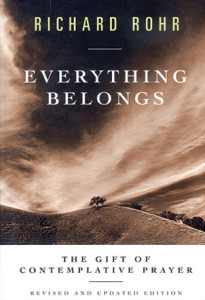
Everything Belongs by Richard Rohr is more difficult to sum up than books I typically read. Like most things that are right, but irritating, this book didn’t come boxed up in “3 steps to solve your problems” — a convenience that, while we knock it as a cliché, we all secretly appreciate — instead, it meandered in the way that would undermine the problem-solving, action-oriented, “small brain” person like myself. This is one of the reasons I loved it.
In a typical mystic style, Everything Belongs: the gift of contemplative prayer led me down a meandering path, exploring the edges of my comfort; all the while knowing this was for my greater good. Making statements like “God is to be found in all things”, referring to “levels of consciousness” or citing Mohammad and Ghandi; these pushed me out of my comfort zone, describing concepts primarily familiar in religions foreign to me. Yet, over and over, Rohr comes back to the center. He returns to the cross and the Christ crucified. As I start wondering, “where is he leading me?” I’m returned to absolute surrender to Jesus; a place equally discomforting, but central to my faith.
While I don’t know much of Fr. Rohr, a priest, author and speaker who runs the Center for Action and Contemplation in Albuquerque, New Mexico, I believe he is exploring and unveiling a level of awareness that our Western heritage has not pointed it’s light on, perhaps since it’s inception.
Rohr explores the gift of contemplative prayer, highlighting the beauty of simply being and allowing room for dichotomies. For example, whereas the western church in particular prefers to button things up or present difficult topics like death, pain and loss in the cheeriest perspective (if acknowledged at all), the gift of contemplative prayer allows us to sit with the grief and all the while experience the nurturing peace of God. So God is not separate from these things, but present in them. Try that on for size — it’s easier said than done.
The book doesn’t try to incite a revolutionary war against western culture. In fact, in the opposite sentiment entirely, it’s actually trying to unify both western and eastern thinking, seeing the beauty and mutual dependency in both.
If I were to summarize what I received from the book, I would say this: Learn the art of simply being. Christ-centered contemplative self-knowledge only points to a greater revelation of God. Our identity is transformed when we sit with Him and — through surrendered humility — let go of our ego, allowing us to love fully, as Christ loved us. A Christ-centered identity frees us from the insatiable need to do more, be more and put everything into tidy little boxes we can wrap our minds around. An “Everything Belongs” mentality says “here I am Lord, your servant is listening.”

